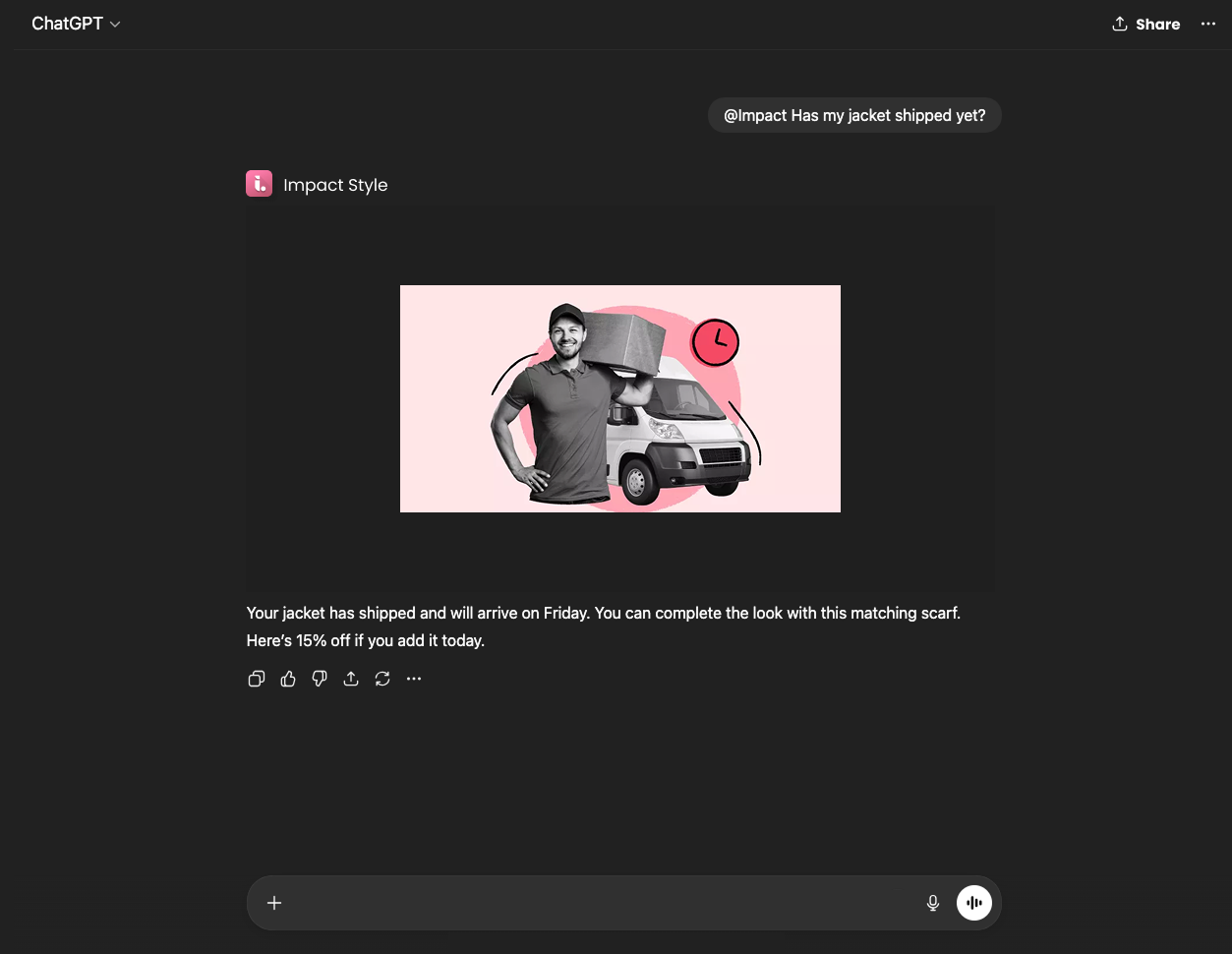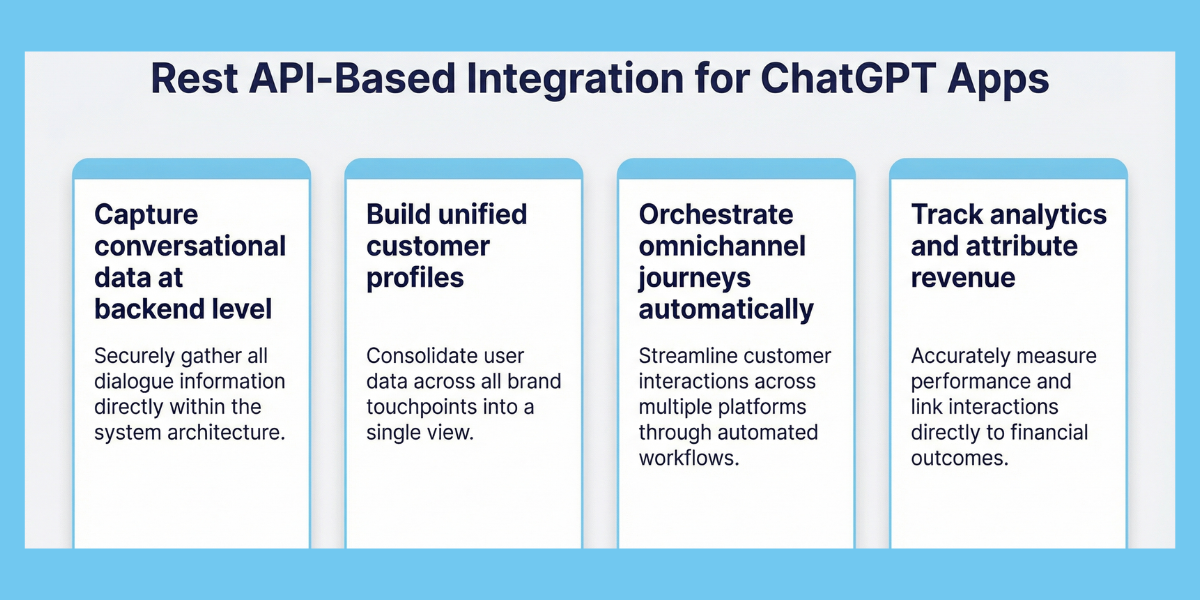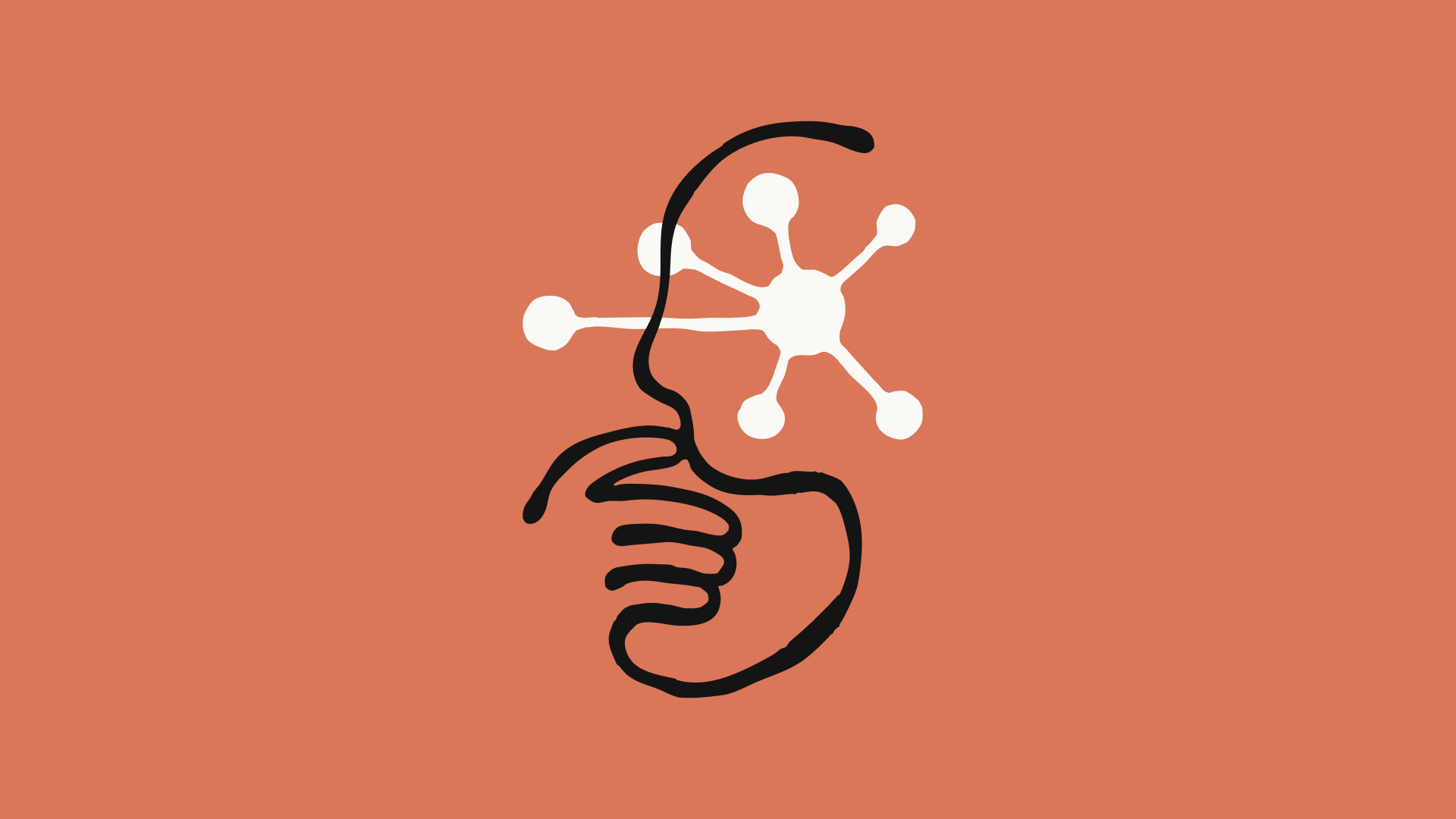
Integrating ChatGPT Apps with Your Engagement Platform For Seamless Customer Journeys
TL;DR: Most brands with ChatGPT apps lose valuable conversation data when those apps don’t connect to engagement platforms. REST API integration with platforms like Netmera captures chat behavior, triggers campaigns based on user actions across email/push/SMS, and attributes revenue to conversational touchpoints.
ChatGPT has over 700 million active users, with 2.5 billion prompts sent daily.* Within this ecosystem, brands are building ChatGPT apps to compare products, plan trips, answer support questions, and guide users to purchase.
Most brands fail to integrate ChatGPT apps with their engagement platforms. Without integration, those conversations never make it into the marketing stack, and your goldmine of customer intent stays unmined. You cannot use questions to segment users. You cannot trigger follow-ups based on intent.
Netmera eliminates these problems through REST API integration. When your ChatGPT app calls Netmera’s API, conversational engagement flows into unified customer profiles. User actions become structured events that trigger campaigns across email, push, SMS, and in-app messages. You track what users ask, click, and convert on.
Now, we’ll walk through how REST API integration works and show three scenarios (Retail, Travel and Finance) where ChatGPT app conversations become measurable, automated engagement.
What Are ChatGPT Apps and Why Do They Matter for Engagement?
ChatGPT apps are interactive tools that run inside the ChatGPT interface. You call them by name during a conversation, and they perform tasks without forcing you to leave the chat. Need a playlist? Invoke Apple Music. Want to draft slides? Call Canva. Or if you’re looking for a hotel, bring up TripAdvisor. (Source).
These apps fetch information, execute actions, and guide users toward decisions, all within the same conversational thread.

How they differ from standard ChatGPT and Custom GPTs
Standard ChatGPT answers questions but doesn’t connect to external services. Custom GPTs let you build specialized assistants with tailored instructions, but they still live in isolated conversations. ChatGPT apps connect to live customer records, pull real data, and execute tasks that matter for your business.
Why ChatGPT Apps Need Integration with Your Engagement Platform
Users research products, plan purchases, and seek recommendations inside your ChatGPT app. Those conversations generate valuable intent signals.
Without integration to your engagement platform:
➠ You can’t segment based on what users ask.
➠ You can’t trigger follow-ups across owned channels.
➠ You can’t attribute conversions back to ChatGPT app interactions.
When you integrate your ChatGPT app with Netmera, the opposite happens.
Take a travel brand’s ChatGPT app capturing trip planning behavior:
✔️That data flows into Netmera’s unified customer profiles.
✔️Netmera triggers an email when flight prices drop, sends a push notification before prices rise, and attributes hotel bookings back to the initial chat conversation.
Netmera’s REST API integration captures conversational engagement at the backend level, turning every user action into events that drive omnichannel campaigns.
Why Choose REST API for ChatGPT App Integration
Netmera’s REST API integration enables four strategic capabilities for ChatGPT apps: backend-level data capture, unified customer profiles, omnichannel journey orchestration, and precise analytics with revenue attribution. Here’s how each one works.

Backend-Level Conversational Data Capture
With REST API integration, conversational engagement is captured at the backend, where intent and outcomes are already defined. Searches, selections, and conversions are reported with the relevant context.
This shifts tracking from the interface to the decision layer. Events represent business actions, not UI interactions. REST API captures what actually happened and what it means for the customer journey: the search query with filters, the product clicked with pricing, the purchase completed with revenue.
Unified Customer Profiles Across All Touchpoints
Netmera consolidates data from mobile apps, websites, CRM, and ChatGPT into single 360-degree profiles. If a user exists in Netmera from web or mobile activity, their ChatGPT app behavior enriches that existing profile. If they’re new, Netmera creates a profile with a source tagged as ChatGPT and matches it later via email, phone, or external ID.
Omnichannel Journey Orchestration
Why stop at capturing what users do in ChatGPT when you can act on it immediately? A platform like Netmera comes in here. By connecting chat behavior to its no-code Journey Builder, it lets you act across every channel: mobile marketing campaigns via push notifications, email campaigns with personalized content, SMS for time-sensitive offers, in-app messages when users return, and geofence-triggered notifications based on location.
Precise Analytics and Attribution
When ChatGPT app interactions flow into Netmera, they connect to the same analytics engine that tracks your web and mobile channels. Funnel analysis shows drop-offs and anomaly detection alerts you when engagement patterns shift.
When someone buys, you know which ChatGPT conversation influenced that purchase. That’s revenue attribution, which connects sales back to the interactions that drove them.
The bottom line: REST APIs capture what users do, like searching, selecting, or buying, and let your engagement platform activate campaigns based on that behaviour.
ChatGPT App Integration Examples: Retail, Travel and Finance
Here’s what this looks like when you put it to work. Three industries, same integration approach. Chat happens, data flows to Netmera, follow-ups trigger automatically, revenue gets attributed.
Scenario 1: Retail – Personal Stylist App

A fashion brand builds a ChatGPT app for outfit recommendations.
The user asks for an interview outfit. StyleApp responds in the chat and sends a “consultation started” event to Netmera with the user’s occasion type, budget, and style preferences.
The user clicks Outfit A, and StyleApp sends an outfit viewed event. The user saves it but doesn’t buy it, so Netmera segments them into “High-intent shoppers.”
The next day, a push notification appears: “Your interview outfit is waiting—10% off ends today.” Still no purchase, so an email arrives with alternative options. The user finally buys, and Netmera logs the purchase event with revenue.
Result: Full omnichannel customer journey visibility, automated engagement, revenue attribution.
Scenario 2: Travel – Trip Planning Assistant

A travel company builds a ChatGPT app for itinerary creation.
The user says, “Plan a 5-day Barcelona trip,” and TripApp builds the itinerary while calling Netmera. It registers the user and fires a “trip planned” event with destination, dates, and budget.
The user saves the itinerary, triggering an “itinerary saved” event. Three days later, an email arrives through Netmera: “Flight prices to Barcelona dropped 15%.” One week later, a push notification says, “Book before prices rise.”
The user books a flight, and a “flight booked” event logs with revenue. This triggers an email with Barcelona hotel recommendations. The user books a hotel, and a “hotel booked” event fires.
Result: Multi-step customer journey automation. Full trip value attributed to initial ChatGPT app conversation.
Scenario 3: Finance – Investment Portfolio Assistant

A fintech company builds a ChatGPT app for personalized investment advice.
The user asks, “Help me build a $10,000 investment portfolio.” InvestApp asks about risk tolerance and investment timeline, then sends a “portfolio consultation started” event with the user’s preferences and target amount. Netmera registers.
The user saves the recommended allocation but doesn’t open an account, so they’re segmented into “High-intent investors.”
Two days later, the fintech uses Netmera to send an email with the saved portfolio breakdown and a link: “Open your account in 5 minutes.” Still no action, so a push notification follows: “Tech stocks dipped—ideal entry point for your allocation.”
The user opens an account and deposits $10,000. Netmera logs both actions with revenue.
Result: Complete investment journey tracked. Full portfolio value attributed to initial ChatGPT app conversation.
The Same Integration Approach Works for Claude Apps
Anthropic’s Claude recently launched interactive apps for workplace tools like Slack and Notion. When users interact with services inside Claude’s chat interface, like searching for files in Notion or sending Slack messages, those interactions generate the same valuable engagement data as ChatGPT apps do.

Build your Claude integration the same way. Your app backend calls Netmera’s API, turning Claude conversations into another actionable engagement channel. Conversational behavior feeds customer profiles, powers cross-channel campaigns, and drives revenue attribution.
Your users choose between ChatGPT or Claude, while Netmera captures engagement from both platforms using the same integration architecture.
How to Evaluate Engagement Platforms for ChatGPT App Integration
When evaluating customer engagement platforms for ChatGPT app integration, look for these core capabilities. Without them, conversational data stays isolated and can’t drive campaigns or revenue.
REST API integration for backend data capture
Why it matters: Your app backend knows exactly what happened: what users searched for, which product they selected, how much they spent. REST API sends that context directly to your platform.
What to ask: “Does your platform support REST API integration for ChatGPT apps, or do you only offer SDK-based tracking? Can my app backend send structured events directly to your API?”
Campaign activation based on tracked chat behavior
Why it matters: Chat data should launch campaigns across email, push, SMS, and in-app based on user behavior in your ChatGPT app.
What to ask: “Can I set up journeys that trigger based on ChatGPT app behavior? Which channels can I activate from chat events? Do I need developer resources to build these workflows, or does your platform handle it through journey automation?”
Unified customer profiles across all channels
Why it matters: ChatGPT behavior enriches the same profile that holds web activity and purchase history. Separate chat records fragment your customer data.
What to ask: “When a user interacts with my ChatGPT app, does that data enrich their existing profile, or does it create a separate record? How does your platform match ChatGPT users to profiles from other channels?”
Revenue attribution for conversational touchpoints
Why it matters: Know which chat conversations drive purchases and which channels influenced the final decision.
What to ask: “Does your platform attribute revenue to ChatGPT app interactions? Can I see which chat conversations lead to conversions? How does attribution work for journeys that start in chat?”
ChatGPT Apps as a First-Class Engagement Strategy
ChatGPT apps represent a new frontier for customer engagement. To capture their full potential, you need more than campaign tracking. You need conversational engagement capture, omnichannel journeys, and unified customer profiles that connect chat behavior to every other touchpoint.
Netmera’s REST API integration connects ChatGPT apps and Claude apps behavior directly to your engagement operation. What matters is not only which events are tracked, but that every meaningful action can trigger the next step.
Building a ChatGPT app or a Claude app? Perhaps you already have one? See how Netmera integrates conversational AI to power omnichannel engagement. Contact us to explore what’s possible.
FAQs about ChatGPT Integration with Your Customer Engagement Platform
ChatGPT app integration connects your custom app to a customer engagement platform. This enables you to capture conversational data, trigger campaigns across channels, and attribute revenue back to chat interactions.
Your ChatGPT app backend calls the platform’s REST API directly. When users search, click, or convert, the app fires structured events with parameters. This captures conversational engagement automatically.
Yes. The REST API integration approach works identically for both ChatGPT and Claude apps. Your engagement platform treats Claude app interactions the same way it treats ChatGPT interactions—as structured events that trigger campaigns and enrich customer profiles.
You gain the ability to segment users by chat behavior, trigger follow-up campaigns across channels, and attribute revenue to conversational interactions. Chat conversations become measurable multi-touch customer journeys.
You need a ChatGPT app with backend access, an engagement platform with REST API support, and developer resources to implement event tracking. Once integrated, marketers and app managers can segment users, launch campaigns, and track results independently through the CEP’s interface, as with Netmera.
Burcu Ulucay – Content Marketing, Netmera
Burcu Ulucay
Content Marketing, Netmera